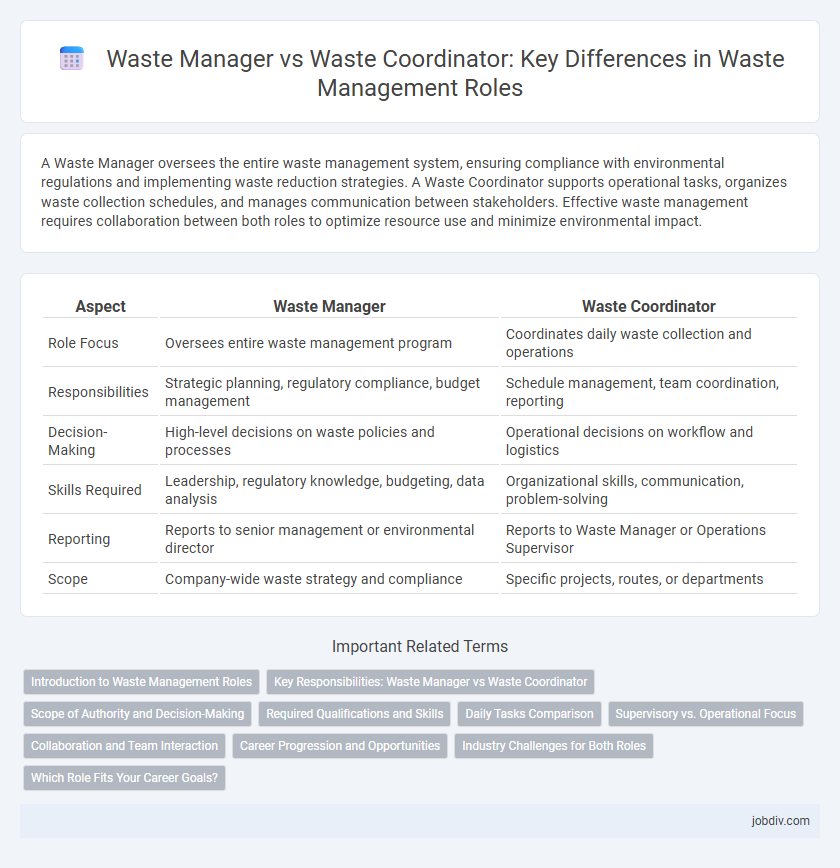A Waste Manager oversees the entire waste management system, ensuring compliance with environmental regulations and implementing waste reduction strategies. A Waste Coordinator supports operational tasks, organizes waste collection schedules, and manages communication between stakeholders. Effective waste management requires collaboration between both roles to optimize resource use and minimize environmental impact.
Table of Comparison
| Aspect | Waste Manager | Waste Coordinator |
|---|---|---|
| Role Focus | Oversees entire waste management program | Coordinates daily waste collection and operations |
| Responsibilities | Strategic planning, regulatory compliance, budget management | Schedule management, team coordination, reporting |
| Decision-Making | High-level decisions on waste policies and processes | Operational decisions on workflow and logistics |
| Skills Required | Leadership, regulatory knowledge, budgeting, data analysis | Organizational skills, communication, problem-solving |
| Reporting | Reports to senior management or environmental director | Reports to Waste Manager or Operations Supervisor |
| Scope | Company-wide waste strategy and compliance | Specific projects, routes, or departments |
Introduction to Waste Management Roles
A Waste Manager oversees the strategic planning and execution of waste reduction, recycling, and disposal programs, ensuring compliance with environmental regulations and optimizing resource efficiency. A Waste Coordinator supports operational activities by organizing waste collection schedules, managing documentation, and facilitating communication between departments and waste service providers. Both roles are critical in maintaining effective waste management systems within organizations, contributing to sustainability goals and regulatory adherence.
Key Responsibilities: Waste Manager vs Waste Coordinator
A Waste Manager oversees overall waste management strategies, including developing policies, ensuring regulatory compliance, and managing waste reduction programs across an organization or municipality. In contrast, a Waste Coordinator focuses on the logistical aspects, such as scheduling waste collection, coordinating with service providers, and maintaining records of waste disposal activities. Both roles are essential for efficient waste management, with the manager taking a strategic leadership position and the coordinator handling operational execution.
Scope of Authority and Decision-Making
A Waste Manager holds comprehensive authority over waste management operations, including strategic planning, budget allocation, and compliance enforcement, enabling high-level decision-making across departments. In contrast, a Waste Coordinator's scope focuses on implementing specific waste management programs, coordinating daily activities, and ensuring operational tasks align with established policies. Decision-making for a Waste Coordinator is typically limited to logistical adjustments and communication between teams, with escalations to the Waste Manager for broader or critical issues.
Required Qualifications and Skills
A Waste Manager typically requires a bachelor's degree in environmental science, engineering, or related fields, along with extensive experience in waste management practices, regulatory compliance, and project leadership. Key skills include strategic planning, staff supervision, budget management, and knowledge of environmental regulations. In contrast, a Waste Coordinator usually needs a diploma or associate degree with practical experience, emphasizing skills in scheduling, data tracking, communication, and coordination between operational teams and regulatory agencies.
Daily Tasks Comparison
A Waste Manager oversees the entire waste management system, including planning, budgeting, and compliance with environmental regulations, ensuring efficient waste collection and disposal processes. A Waste Coordinator focuses on operational tasks like scheduling pickups, managing waste collection staff, and coordinating logistics to maintain smooth daily waste flow. Both roles require strong organizational skills but differ in their scope of responsibility and decision-making authority within waste management operations.
Supervisory vs. Operational Focus
A Waste Manager typically assumes a supervisory role, overseeing waste management programs, ensuring compliance with environmental regulations, and managing team performance to optimize waste disposal processes. In contrast, a Waste Coordinator focuses on operational tasks such as scheduling waste collection, coordinating logistics, and handling day-to-day waste handling activities. The Waste Manager's responsibilities emphasize strategic planning and policy enforcement, while the Waste Coordinator concentrates on execution and workflow management within waste operations.
Collaboration and Team Interaction
Waste Managers and Waste Coordinators collaborate closely to optimize waste management processes, ensuring efficient resource allocation and regulatory compliance. Waste Managers provide strategic oversight and decision-making, while Waste Coordinators facilitate day-to-day operations and communication between teams. Their teamwork enhances workflow integration, promotes environmental sustainability, and improves overall waste handling effectiveness.
Career Progression and Opportunities
Waste Managers oversee comprehensive waste management programs, leading teams and developing strategic initiatives to improve efficiency and compliance. Waste Coordinators handle day-to-day operations, coordinate waste collection schedules, and ensure proper disposal processes are followed. Career progression typically advances from Waste Coordinator to Waste Manager, with opportunities expanding into environmental consulting, sustainability roles, and regulatory compliance leadership.
Industry Challenges for Both Roles
Waste Managers face challenges in optimizing large-scale waste disposal systems and ensuring regulatory compliance across multiple sites, while Waste Coordinators struggle with coordinating daily waste collection logistics and maintaining accurate reporting. Both roles must address industry pressures such as increasing waste volumes, tightening environmental regulations, and the need for sustainable waste management practices. Efficient communication and integration of technology are critical to overcoming operational inefficiencies and enhancing waste diversion rates.
Which Role Fits Your Career Goals?
A Waste Manager oversees comprehensive waste management programs, focusing on strategic planning, regulatory compliance, and resource allocation to minimize environmental impact. In contrast, a Waste Coordinator handles daily operations, including scheduling, team supervision, and logistics to ensure efficient waste collection and processing. Choose a Waste Manager role for leadership and policy development opportunities, while a Waste Coordinator position suits those seeking hands-on operational experience in the waste management industry.
Waste Manager vs Waste Coordinator Infographic

 jobdiv.com
jobdiv.com